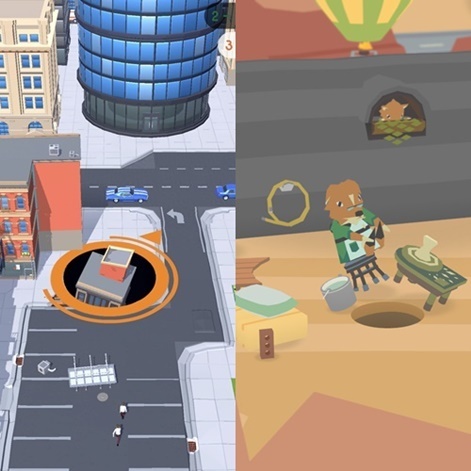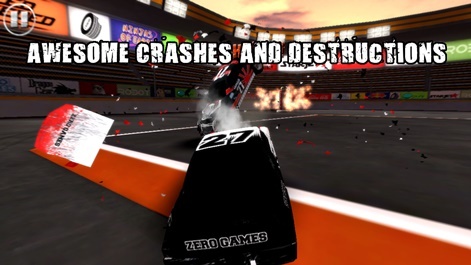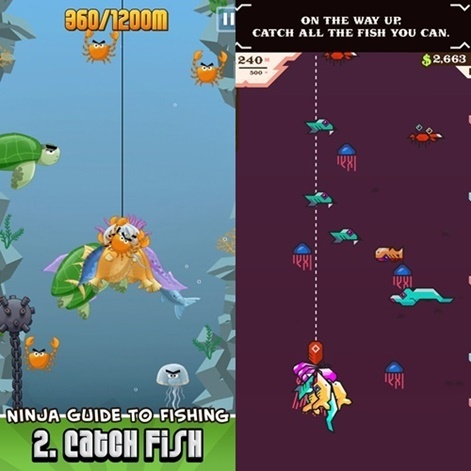Where does the line fall between creative influence and mere reproduction? It’s a question that has lingered among the mobile games industry, with the issue of cloning ever prominent.
One of its more recent occurrences happened last June when Indie developer Ben Esposito took to Twitter to air his grievances over his claims that Voodoo had copied Donut County’s gameplay premise in Hole.io, which involves a hole in the ground that grows larger as it swallows more items.
Pocket Run Pool dev Zach Gage meanwhile previously explained that cloners typically swipe mechanics from premium games and apply them to free-to-play titles.
In his own experience, he found that his games were easy to clone as the ideas were complicated but the execution was relatively simple.
To find out more about the problems indie developers face concerning games cloning we turned to our Indie Mavens. Specifically, we asked them:
How big is the cloning issue that is facing indies?
What do you think can be done to combat the issue?
How big is the cloning issue that is facing indies?
Big.
It’s always been an issue, but nowadays it’s not just relatively easy for a cloner to make duplicates of simpler games (and the simple games being the sort of thing everyone wants), but there are major companies whose entire business model is based on it.
Copyright and patent laws have never really helped the little guy in this regard and a large number of the cloners being based in places where it’s nigh on impossible to do anything about them, even if you did have a trust fund to blow on lawyers, doesn’t help either.
There is an element of “nothing is original”.
The problem is the blatant clones that copy a game (even to the point of cloning its artwork or blatantly lifting it from the original package) and then become more popular than the original because of the way visibility works on the stores.

The more people are viewing or downloading it, the better the visibility. Of course, if you’re a big league cloner, you buy a tonne of installs and advertising as soon as you launch your clone.
The other impact of the cloning is that it stifles creativity, new ideas as well as the ability for an Indie to market their upcoming games.
As seen with various indie games in the past, doing the classic PR practice of showing work in progress to build interest is just a great way to end up with a clone of your game being released before you’ve even finished writing it.
That can lead to the problems of second-guessing whether you let anyone know about a title pre-release or even bother working on it if it’s just going to get cloned.
What do you think can be done to combat the issue?
Firstly, the media and the stores need to do a bit more due diligence.
The media and the stores need to do a bit more due diligence.Aaron Fothergill
Before giving a massive sales boost to a game with a review or a store promotion, make sure you have done a basic check to see if it’s a clone.
Also, even if the clone seems to be popular, should you be promoting it (or even mentioning it) over the original?
I’m not talking about blanking games that are obviously influenced by prior games but have their own unique features, of course, just blatant clones.
Publicity is the fuel for the clones, so if we do want to combat the issue as an industry, the fuel supply needs to be cut off.
Secondly, not an ideal solution, but indie developers may just need to be more secretive or sneaky.
Don’t tell everyone your trade secrets and show off WIP videos that are a “how to” for writing a clone of your upcoming game.
Or, if you do, make sure it’s close enough to the release date that it won’t be cloned before you release. Dong Nguyen’s follow up to Flappy Bird was massively cloned within two days of him releasing a WIP video of it, about a week before his release.
Of course, nothing stopping devs getting sneaky and releasing fake WIP videos to throw the cloners off the scent.
Let them spend a couple of weeks of expensive dev time on a clone of “Super Jelly Poodle Squad” while you get your game done.
Indies are the top prey for predatory business practices, including cloning.
Indies are the top prey for predatory business practices, including cloning.Tanya X. Short
Our innovative ideas are lower-budget to reverse-engineer. Our production schedules are less proven, adding delays to our release schedules. Our marketing budgets are lower, pressuring us to be more transparent and trusting with our communities. Our legal defence budgets are non-existent.
We're like little baby squirrels staring helplessly into the mouth of a tiger.
Unfortunately, the top strategy to combat predation is probably to adopt the practices taken by bigger companies to protect themselves, such as:
- Base your game's value proposition on the quality of execution/content, not on novelty
- Be intensely secretive until you're nearly finished and can definitely beat copycats to market
- Build up your community from game-to-game so your fanbase feels loyalty and ignores copycats
I'm not a huge fan of one and two, but it's worth considering how much risk you're taking on when you decide to make games that are elegant, novel and then take four years to release.
Hard to answer this question. I think it's pretty big in fact.
Even games with moderate success have cloning issues. When we released Extreme Gear: Demolition Arena a few years ago we saw a lot of low budget clones appear in the following months, despite the fact our game was never a big hit.
As making games has never been so easy, copying even quite complicated titles is now possible.
Most of those clones are not big threats. Most of them are done by one-man studios with cheap, if not free, Unity assets.

Problems occur when bigger studios begin to have an interest in your games and try to clone them. Then there's little you can do as you can be sure they will have some success with your idea.
Indies don't have legal departments or lawyers, so sometimes when it happens you just have to pray that the bigger studio will have enough success with your own game idea that you will have a chance to enjoy it too.
Another point is that if your game is very simple and easy to duplicate, you can be doomed as soon as you announce it.
When the game is a bit bigger and more technologically advanced, time is on your side, as it will take time for other studios to clone it. Don't take this as advice though, only making complicated games is not really a solution. But it honestly helps a bit.
How big is the cloning issue that is facing indies?
This threat has always been around and it will never disappear.
It’s the sad, hard, cold truth and it makes my heart hurt. What I’ve gathered from these clone-heads is that they prey upon games that are easy to dissect just by looking at them.
Some cloners just look at the successes and some go look for the undiscovered gems they feel they can easily improve upon.
But not everything would fall under the category of a blatant clone, which makes this whole discussion somewhat of a grey area.
Some games are just a better iteration upon a previous idea.
This threat has always been around and it will never disappear.Erik van Wees
I guess it’s about conquering the hearts of your players that will make the difference.
What do you think can be done to combat the issue?
Make your games in such a way that all the pieces connect so well together that if one element were to be replaced, the experience doesn’t land as solid as the original does.
“How do you do that?” This is where the design for game feel comes into play.
From start to end, the audio-visual aesthetic should be considered along with the mechanics and how the play is conducted and intended to be experienced.
When you refine the way interaction merges with the audio-visual feedback it will make the experience so sophisticated that once stripped from one element it should “cheapen” the experience.
Clones are usually dependant on replacing the audio-visual assets to make it seem less of a clone.
To potentially prevent a clone to succeed is giving yourself enough time to fully understand how your game’s components work together before you give the cloners a chance to find an easy and effective iteration.
You sometimes see a clone version of a game being “better” than the original.
That “better” usually means most people find its audio-visual feedback more suiting to the gaming experience than you originally envisioned. Though, this can just be a matter of taste.

Some clones make an effort to fine-tune the mechanics.
If your mechanics aren’t polished enough or “just okay”, you’re not giving players a reason to want to play yours over the clone.
Sometimes just having a very appropriate context for your game can make it feel “right” and a clone feel “off”.
In the end, it’s an experience you’re crafting for the player. That experience comes from your sources of inspiration, which is something cloners can’t clone if they don’t know it.
I do feel most of the time you are completely powerless and nothing can be done about it.
Maybe make a big media stink about it so they hopefully get shunned out of existence.
I still remember Vlambeer’s Ridiculous Fishing being cloned and they sought media attention to retaliate.
In the end, they had many people backing them up and recommending the original version to other players.
It can work because the press seems to like to write about these stories and can aid you in your “crusade”.

























